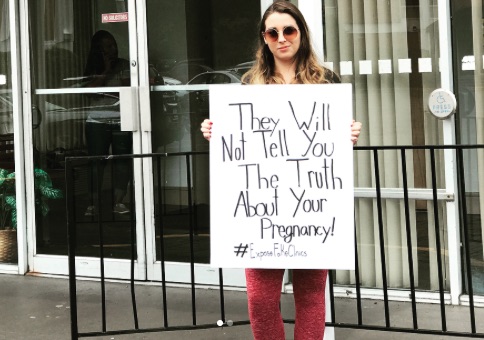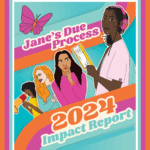By Literary Women in Action; Image from Bust
You might have seen billboards or signs along the highway or around your neighborhood. Pregnant? Need Help? Call This Number.
“Great!”, you might think. But Crisis Pregnancy Centers aren’t really about helping you as you think through your options. Rather, they are about ensuring that you avoid an abortion altogether—no matter what you want, or what you think is best for your life.
To that end, CPCs often provide misleading—or downright deceitful—“information” to pressure pregnant people, or to make her feel she has no options.
So what exactly are CPCs, and how can you spot one?
What Do Crisis Pregnancy Centers Actually Do?
The problem with Crisis Pregnancy Centers isn’t so much that they oppose abortion—they have a right to!—but that they’re so misleading about their agenda, and so dishonest with the women they are pretending to serve. Here at Jane’s Due Process, we’ve seen lots of teens who have been lied to by Crisis Pregnancy Centers—sometimes with damaging results. Here are just a few examples – we use the name “Jane” to represent the teens we talk to so they stay anonymous:
- Janes being told (falsely) that they were too far along to have abortions at all. One Jane called us after the CPC told her she was too far along – her boyfriend’s mom had done her own research and realized the CPC was lying.
- One Jane was told by a CPC “counselor” that she’d had an abortion at 17 and was never able to get pregnant again. Though Jane still wanted her abortion, her anxiety about the procedure skyrocketed.
- One Jane took public transportation to the abortion clinic, where a sidewalk protester diverted her to a CPC, promising a free ultrasound. She didn’t have regular phone access, so her JDP case manager was not able to get in touch with her easily and didn’t find out about her missed appointment for a couple of weeks. Jane ended up being delayed into her second trimester, requiring a more expensive procedure.
- One Jane who was already a parent went to a CPC because she didn’t have the $115 she was quoted for an ultrasound at an abortion clinic. The CPC gave her diapers for her son, which she liked, but they delayed her a couple weeks in accessing care and told her she’d be killing her baby.
- Another Jane went to a CPC and was given a baby blanket instead of an abortion.
- One Jane cancelled her ultrasound at an abortion clinic because her boyfriend found a clinic closer to their house. Because there are so few clinics in her city, her case manager immediately realized she must be talking about a CPC. Because of the “abortion information” on their website, her boyfriend had really thought it was a legitimate clinic. She wasn’t able to reschedule her ultrasound at the abortion clinic for another week, delaying her abortion.
- Teens aren’t the only ones duped by CPCs. One 24-year-old called Jane’s Due Process in tears after visiting three CPCs in one day, thinking each one was an abortion clinic—only to be shamed and humiliated at each one. She was terrified that abortion was not legal, or that there weren’t any clinics in her major city.
- And that’s only the tip of the iceberg. In 2014, NARAL published a comprehensive investigative report documenting the full scope of Crisis Pregnancy Center’s activities—and effects—in the state of Texas.
If all this sounds incredibly sneaky, that’s because it is. Crisis Pregnancy Centers have one goal—to prevent women from exercising their constitutionally protected right to abortion—and they’ll engage in pretty much any tactic in order to do that. That includes humiliation, manipulation, and lots and lots of deception.
Even worse, CPCs tend to have lots of money behind them. The state of Texas spends millions of taxpayer dollars a year supporting Crisis Pregnancy Centers (thank your friendly Texas state legislature for that). And seven states (including Texas!) actually use Temporary Assistance for Needy Families funds to finance CPCs. In other words, money that’s supposed to go to supporting poor families is actually going to help religious organizations lie to women about their bodies.
Yeah, you read that right.
How Can You Spot a Crisis Pregnancy Center?
So how can you identify (and avoid) Crisis Pregnancy Centers? This can be tricky, since CPCs don’t typically want you to know what they are ahead of time—CPCs have tremendous marketing resources at their disposal. But there are certain clues you can use to help figure out if you’re dealing with a CPC—key words, phrases, and patterns that are pretty easy to spot, once you’re familiar with them.
Watch out for:
- Names or websites that feature the words “life,” “hope,” or religious language
- Organizations that advertise “abortion information” or “abortion consultation,” but do not say whether they provide procedures (or admit that they don’t)
- An emphasis on miscarriage (as in, “You might not even need an abortion!”), tubal pregnancy (a serious condition that requires a skilled ultrasound technician to diagnose), or the risks and dangers of abortion (which are, in fact, minimal)
- Offers of “abortion recovery” or “abortion counseling,” especially in the context of shaming or religious language
- Mentions of religion, Bible classes, or saving sex until marriage
- Advertising “limited ultrasound”—this indicates that they are not a certified medical facility and cannot provide accurate ultrasounds
- Always refer to your pregnancy as your “baby”. It’s totally fine if you use the word “baby” to refer to your pregnancy, but most abortion clinics will use medical terms like “pregnancy”, “fetus”, or “embryo”.
- Advertising exclusively free services—while free services sound great, real abortion services do cost money
As an example, take a look at the website for Thrive. This one is extremely subtle—especially since it leads with some basically-correct info about the difference between surgical and non-surgical abortion. But look closer, and some of the key words and phrases discussed above begin to emerge. A misleading emphasis on risk? Check! Offering services for free? Check! Vague assurances of empathy without any concrete offers of help? Many, many checks!
Compare that to the website of Southwestern, a legitimate abortion clinic. Southwestern has their clinic license number, details which kind of abortion procedures they offer, and on their information page, explicitly say that they offer abortions.
In Conclusion
It’s disheartening to think about the number of Crisis Pregnancy Centers out there—how many people are willing to lie to you about your own body and choices, and how much money the government is willing to spend on this project. But remember that CPCs don’t really have any power over you, if you know what they’re about. At the end of the day, your rights are still your rights, your body is still your body, and your choice is still your choice.
Now you know.




